- Home
- Michael Wallace
Blood of the Faithful Page 2
Blood of the Faithful Read online
Page 2
The words from Ezekiel’s patriarchal blessing came to his mind. Elder Smoot had laid his hands upon his son’s head when the boy was only fifteen. It was a ritual in the church that would give young men and women their lineage through the Twelve Tribes of Israel, as well as pronounce certain blessings and prophesies upon their heads.
“Thy name is Ezekiel,” Father had said, “and thou hast been chosen since the foundations of the world for a great and glorious task. For this reason thy mother chose thy name from the Hebrew, the tongue of the prophets. Ezekiel. It means ‘may God strengthen.’ ”
Ezekiel opened the back door of the temple and stepped into the cool night air. It smelled of sagebrush and sand dunes. Somewhere in the sandstone maze of Witch’s Warts a coyote yipped.
“May God strengthen,” he whispered. “Because I shall be the new prophet.”
CHAPTER TWO
Jacob Christianson entered the bedroom carrying his boots, careful to avoid the worst offenders of his loose floorboards. The house was quiet, the children asleep. Fernie had gone to bed an hour ago and was a still shape beneath the covers, her breathing heavy. He eased her wheelchair out of the way where it blocked his path.
He made his way around to his side of the bed and set down the boots with extra care. Then he unbuttoned his shirt and draped it over the chair next to the window. No pajamas tonight. If he made too much noise, he’d wake his wife, and he didn’t want her awake until he was in bed with his arm around her. Then, he was sure she wouldn’t push him away.
But she stirred when he pulled back the covers. He froze.
“Jacob,” Fernie said in a low, wary voice.
“Shh, go back to sleep.”
The bed creaked as she lifted herself into a sitting position. Since the accident, Fernie’s legs were partially paralyzed, just shy of useless, but she’d become adept at maneuvering herself around without assistance.
“It’s Saturday,” she said. “You shouldn’t be here.”
“Jessie Lyn has been in bed for hours, and you know how hard it is to get comfortable when you’re pregnant. I don’t want to wake her.”
“Don’t be ridiculous,” Fernie said. “She’s only five months along. She’s barely even showing.”
“I’m sure she can wait.” Jacob sat down next to Fernie and felt in the darkness until he found her face. He ran his fingers up her cheek and plunged them into her soft, curly hair. “ ‘Be a polygamist,’ they said. ‘You’ll have sex whenever you want.’ They promised!”
Fernie laughed. “Quit complaining, mister,” she said in that charmingly scolding voice she used. “You know it won’t do any good.”
“I’m not complaining. I’m maneuvering.”
Fernie laughed again, though it sounded more reluctant this time. She was a rule follower, and she had no use for either deception or complaint.
Jacob had little use for either, himself. Once he’d been pushed into a second marriage, caught in a trap at least partly of his own making, there had been no sense fighting. Nobody liked a whiner, least of all himself. And he knew both Fernie and Jessie Lyn were still struggling to adapt. One clumsy move on his part could cut them deeply.
But inside his own head he still railed at the injustice of it. He never wanted this. He’d been fighting a protracted campaign to eliminate new plural marriages for years, and now he found himself the victim of the very thing he’d tried to prevent.
Fernie reached over and touched Jacob’s hand. “You know I’d like to. But it isn’t my turn. What happens when you finally show up and Jessie Lyn is lying there awake and waiting for you?”
“I’m sure she’s asleep.”
“No, you’re not. Women have urges too. They get lonely.”
“Fine, if she’s awake, then I’ll do my duty.”
“A second time? Could you really?”
Could he? Probably not, actually. A decade ago, sure, but he was facing the downslope of his late thirties now, chronically sleep-deprived from his duties and with so many worries on his shoulders. Millions around the world were suffering and dying, and he felt the continual stress of assuring Blister Creek’s own survival. He was still a man, he still responded to a woman’s touch, but if he went into Jessie Lyn’s room after having made love to Fernie, he’d roll over and fall asleep at once. If Jessie Lyn decided to press him—unlikely though that may be—he might be unable to answer the call.
He sighed.
“Go on,” Fernie said. “Tomorrow is our night. I promise I’ll make the wait worthwhile.”
Reluctantly, Jacob headed for the door. There was a certain shame in being turned down by your wife and slinking out of the room with boots and shirt in hand. Knowing she wanted him too didn’t help matters.
He was equally quiet when he slipped into his second bedroom. It was a smaller room in the east wing, past the bedrooms where Jacob’s teenage sisters and his father’s widows slept. The four-poster bed inside had once belonged to his great-great-grandmother Cowley and managed to seem sturdy and timeless as the Ghost Cliffs, yet rickety at the same time.
As much as he tried to prevent it, Jessie Lyn woke up.
“Are you okay?” she asked.
“Sure,” he said. “Sorry for waking you.”
It sounded stiff and fake as it came out. He leaned over and kissed her cheek.
She rolled toward him. “It’s so late. I expected you up a long time ago. There’s nothing wrong, is there?”
“You know, the usual worries.”
He’d have answered more truthfully had it been Fernie asking.
Jessie Lyn snuggled closer to him. She was still young, her body curvy but firm, even though she’d already given birth once by her first husband. A slight bulge of her stomach hinted at her pregnancy. New life grew inside her in defiance of the collapse of civilization and the death of millions.
He’d hooked her up to the ultrasound last week. She was carrying a daughter. His daughter.
Jessie Lyn wasn’t beautiful in a classical sense, but had a cute dimple in her left cheek and a shy, endearing smile. She worked hard and without complaint. That was a valuable trait these days, when the community’s survival rested on a knife’s edge and there could be no shirkers.
According to his sister-in-law Lillian, Jessie Lyn had been Bill Smoot’s favorite wife. But widow with a child or no, any of the old patriarchs of Blister Creek would have been delighted to add such a good, fertile woman to their family either for themselves or for one of their sons. He should be grateful.
“Jacob, I can tell from your voice that something is wrong. You can talk to me.”
As she spoke, she slipped her hand beneath his undershirt and trailed her fingers along his chest. She eased one leg between his.
Damn, she was in the mood. And his body was betraying him, stiffening as her thigh nestled between his legs.
Before marrying her last year, Jacob had slept with only one woman in his life: Fernie. But a decade of marriage and a medical degree hadn’t been enough of an education in sexual matters, apparently. He’d been surprised to discover that Jessie Lyn had her own desires, her own, different ways she liked to be touched. She was more enthusiastic during lovemaking than Fernie, but turned shy and embarrassed the moment it was over. It had taken awhile to tell the difference between when she was feeling cuddly and when she wanted something more. He still wasn’t sure in this case.
He pulled back slightly. He couldn’t sleep with her, not tonight. Not knowing that Fernie was probably still awake in her room, wondering. He’d distract himself.
“I’m going up to the reservoir tomorrow.”
“Oh?” She sounded concerned. “To see if the squatters are still there?”
“We know they’re still there. I need to know their intentions.”
“That’s no secret,” Jessie Lyn said. “They’re waiting for
their chance, that’s all.”
Her voice was tight. She’d lost her first husband during last summer’s turmoil and like most of Blister Creek worried constantly about the gentiles who were still lurking above the valley.
“We don’t know that,” Jacob said. “Anyway, I’ll be careful. We’re taking the Humvee and a .50-caliber machine gun. But waving a white flag so they know we’re not there to attack their camp.”
“I don’t like it, Jacob. Please, think it over. It’s too dangerous.”
“We’ll be okay. They haven’t bothered us and we haven’t bothered them for six months. Not since that last skirmish in the fall when they tried to steal those sheep.”
And a full year had passed since the major battle, his attempt to clear them from the reservoir altogether. They’d been poisoning the water to catch fish, polluting it with their overflowing latrines. That water flowed into the valley, which risked transmitting to Blister Creek cholera and other water-borne illnesses of the kind endemic in the world.
But after the battle, the situation had stabilized. The squatters stopped threatening to overwhelm the valley like a plague of devouring locusts. Jacob had expected them to melt away. Once they’d fished out the reservoir and cleared the hills of game, there’d be no other reason to remain in the cliffs. Yet here they were, a year later, somehow still hanging on with no obvious means of doing so.
“But why?” Jessie Lyn pressed. “What possible good could that do?”
“They might have news about the civil war, about the famine. Maybe even about the volcano, if it has stopped or is erupting again. That will give us an idea how long this will last.”
“It’s going to last until the Second Coming. We all know that.”
Do we? Do we know anything at all?
“We do,” she insisted, as if reading his thoughts. “We know it.”
Jacob didn’t know anything of the sort. The supervolcano in Indonesia was a natural disaster that had chilled the climate, leaving famine and war in its wake. All this talk about Armageddon and the Last Days was the fantasy of an obscure desert cult. No doubt there were other religious sects out there that also thought the global crisis could be attributed to their own peculiar theology. Jacob blamed science and human nature.
But sometimes he felt like the only skeptic left in Blister Creek. His brother David was a believer now, almost as devout as his wife Miriam. Jacob’s sister Eliza had spoken in church two weeks ago and, while she wasn’t exactly breathing fire about the end of the world, she’d made a few comments about faith and God that made Jacob stiffen. Had she found her testimony? Could he stand it if she had?
Which is it? Am I right and everyone else is wrong? Or am I wrong and everyone else is right?
“Jacob?” Jessie Lyn said.
“Hmm? Just thinking.” Again, he concealed his doubts. With Fernie he would have been open. “It may be the end, but you know what the scriptures say. No one knows the day or hour of the Lord’s coming.”
“We know it’s close.”
“What does that mean, close? Could be ten years. A hundred.”
“That’s why we stored food and prepared for the worst,” she said, her tone soothing. “Why we always tried to be self-sufficient.”
“We’re not self-sufficient in medicine. I’m out of morphine, have virtually nothing to treat heart disease. No statins, no antihypertensives. I have to use homemade ether for surgery, and I prescribed my last dose of tetracycline the day before yesterday.”
“I know.” She probably didn’t know the heroic efforts he’d gone through to keep their antibiotics flowing. Recycling unmetabolized antibiotics from the urine of people taking them. Now he was trying to raise cultures of penicillin in a mixture of corn mash and rotting melon, with some promise. Still some details to work out.
“And what about vaccines?” he added. “None of the kids are getting their shots. If you want to see what comes next, take a walk through the cemetery. Look at the gravestones from the 1916 polio epidemic, mostly children. We no longer have a vaccine for that, you know.”
Jessie Lyn shifted her hand to her belly and the gentle swelling pressing against him there. “That worries me, you know it does. But our ancestors survived it. We can too. And it’s a small danger compared to what’s happening in the wider world.”
“Maybe,” he conceded. “But I’m a doctor. I see fifty kids in this valley who haven’t had a single vaccination. I’ve got to do something about it.”
“So you’ll leave the valley to get medical supplies?”
“In part, yes.”
“And the other part?”
He tried to frame it in a way she would understand. “What if there are other saints out there? Salt Lake Mormons who have repented and left their apostate church now that they see what the world is coming to. Maybe God called them to gather to the valley, but they have no way to get here.”
That was more than a little disingenuous. Fernie would have seen through it at once. Jessie Lyn seemed moved.
“Oh, I didn’t think of that. And you think some of them might be in the squatter camp? They say it’s a den of iniquity.”
“I don’t know. Maybe, maybe not. But I’ll find out.”
“Well, if you think it’s right.” Jessie Lyn hesitated. “You’ll be careful, won’t you?”
“Of course.”
“Hold me, please.”
He hadn’t given it conscious thought, but he’d been drawing away from her throughout the conversation. She still had her arms around him, albeit at a distance now, and pulled herself up to him. He embraced her.
She felt for his face in the dark, and kissed him on the mouth. He thought she would press him for more, but then she rested her head against his chest. Jacob held her and stroked her hair. He was relieved when her body relaxed and her breathing turned deep and regular.
He thought about Fernie, sleeping alone on the other side of the house, and wished he was in her bed and not this one.
CHAPTER THREE
In the morning, when the roosters were still shouting their morning reveille and the air was cool and smelling of ripening cornfields mingled with sagebrush blowing in off the desert, Jacob roused his son Daniel to help him load the truck.
Daniel was thirteen and growing, his body turning long and lean. His voice had started to change. Once the boy had blinked away the sleep and fought off a bout of yawns, he eagerly helped. Using wheelbarrows, father and son hauled out two barrels of flour, several sacks of dried peas, and three buckets of powdered milk. Once they’d lifted them into the back, Jacob covered them with sheets and shut the doors. He sent Daniel in to help with breakfast.
Before going inside himself, Jacob turned toward the Ghost Cliffs, which lay a few miles to the north. The rising sun turned the sandstone orange and gold. With the wet weather of the past few years, the overhangs and fissures had turned green, and a profusion of rabbit grass and other vegetation joined the juniper and bristlecone pine that had grown there since Jacob’s childhood.
While he and Daniel had been loading the supplies, the dogs had trotted hopefully around from the back of the house, as if expecting to jump into the truck and go for a ride. Two of them now retreated to the porch, disappointed, but one still stood there wagging his tail.
“Sorry, boy,” Jacob said, reaching down to scratch the old dog behind his ears. “No more joyrides for dogs. Those days are past.”
All his dogs were either former strays or animals he’d rescued or healed of some ailment or another. This one had been a poor, starved thing belonging to a man Father had driven out of Blister Creek. Abusing his animals, abusing his family. Not unexpectedly, the dog had turned into one of the most grateful, loyal animals Jacob had ever owned. His only flaw was a propensity to tangle with the skunks that wandered in off the desert.
Jacob spotted his brother David on the p
orch of the house next door, watching. David came down when he saw Jacob looking. The dog trotted over to greet him, then followed him back, still wagging his tail.
“What are you hiding in there?” David asked with a gesture at the truck. He pushed aside the dog, who was helpfully shoving a nose into his crotch.
“I’m having second thoughts about Miriam,” Jacob said. “I don’t want her picking a fight. Do you think we should bring Lillian instead?”
“Nice deflection.” David glanced at the back of the truck. “Well?”
“I’m not hiding anything.”
“Of course. And that’s why you got up early to haul all that stuff out. You were going to wait until we get on the road before saying anything.”
“Am I that transparent?”
“I’m your brother. Of course you are. So what is it?”
“I miss the days when you remembered you were my younger brother,” Jacob said with a smile. “And you didn’t question me all the time.”
David raised an eyebrow. “What brother are you talking about? That was never me. So? What’s in there?”
“Flour, peas, powdered milk. Not a lot. Enough to show peaceful intentions.”
“And spread the word that we’re giving away free food. I’m sure that will help.”
“I suppose you’d rather charge in, guns blazing.”
“I’ve had enough killing. But why go up at all? What we’re doing is working.”
“It’s working to keep us bottled up. East is an endless wilderness. Go south and west and we run into bandits. That leaves north, past the squatters.”
“There’s nothing north either.”
“There’s no way to know from here, that’s for sure. But if we get past the reservoir, we’re only an hour drive from Panguitch. Don’t you want to know what’s up there? If there’s still a state government or any towns that aren’t completely abandoned?”
“Not really. My curiosity these days is mostly about whether or not we can stay alive for another season.” David shrugged. “Anyway, there’s no rush. We’re safe here. We fought our enemies and won. Let the squatters wither and die. Whatever they’re living on, it can’t last forever. We stay here, the Lord will protect us. We leave, we face the destruction of the world.”

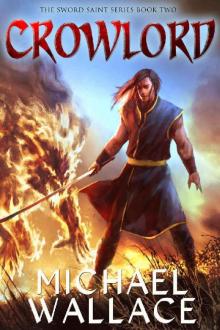 Crowlord (The Sword Saint Series Book 2)
Crowlord (The Sword Saint Series Book 2) Crowlord
Crowlord The Red Sword- The Complete Trilogy
The Red Sword- The Complete Trilogy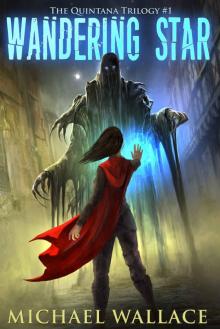 Wandering Star (The Quintana Trilogy Book 1)
Wandering Star (The Quintana Trilogy Book 1) Bladedancer
Bladedancer Sword Saint
Sword Saint The Alliance Trilogy
The Alliance Trilogy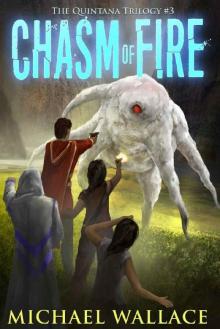 Chasm of Fire
Chasm of Fire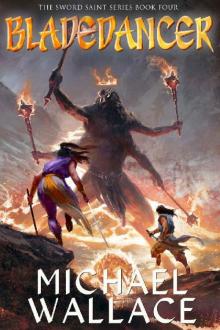 Bladedancer (The Sword Saint Series Book 4)
Bladedancer (The Sword Saint Series Book 4) The Devil's Deep
The Devil's Deep Shadow Walker (The Sword Saint Series Book 3)
Shadow Walker (The Sword Saint Series Book 3) Starship Blackbeard
Starship Blackbeard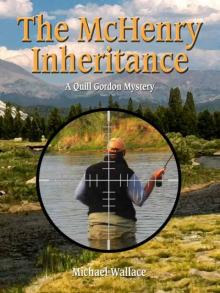 The McHenry Inheritance (Quill Gordon Mystery Book 1)
The McHenry Inheritance (Quill Gordon Mystery Book 1) Sun King (The Void Queen Trilogy Book 3)
Sun King (The Void Queen Trilogy Book 3) Blood of Vipers
Blood of Vipers Righteous - 01 - The Righteous
Righteous - 01 - The Righteous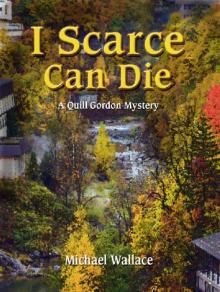 I Scarce Can Die (Quill Gordon Mystery Book 5)
I Scarce Can Die (Quill Gordon Mystery Book 5) The Devil's Cauldron
The Devil's Cauldron The Wicked (The Righteous)
The Wicked (The Righteous)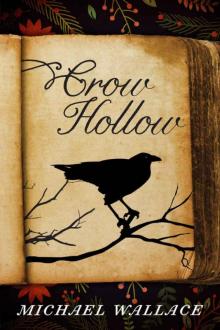 Crow Hollow
Crow Hollow Righteous03 - The Wicked
Righteous03 - The Wicked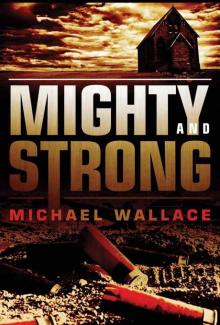 Righteous02 - Mighty and Strong
Righteous02 - Mighty and Strong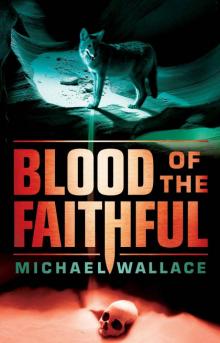 Blood of the Faithful
Blood of the Faithful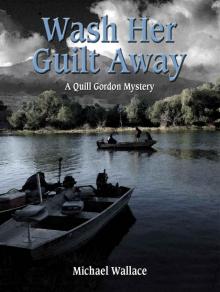 Wash Her Guilt Away (Quill Gordon Mystery Book 2)
Wash Her Guilt Away (Quill Gordon Mystery Book 2)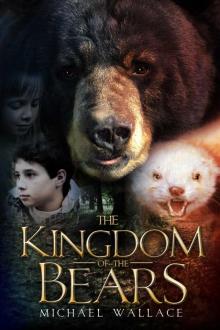 The Kingdom of the Bears
The Kingdom of the Bears The Emerald Crown (The Red Sword Trilogy Book 3)
The Emerald Crown (The Red Sword Trilogy Book 3) The Dark Citadel
The Dark Citadel The Warrior King (Book 4)
The Warrior King (Book 4) Rebellion of Stars (Starship Blackbeard Book 4)
Rebellion of Stars (Starship Blackbeard Book 4)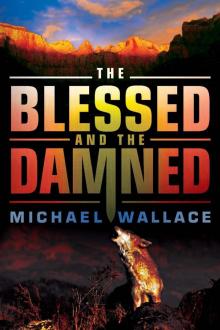 Righteous04 - The Blessed and the Damned
Righteous04 - The Blessed and the Damned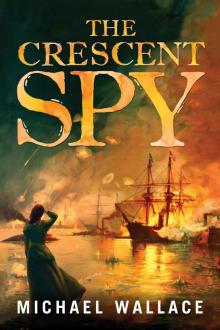 The Crescent Spy
The Crescent Spy Queen of the Void (The Void Queen Trilogy Book 1)
Queen of the Void (The Void Queen Trilogy Book 1) The Red Sword (The Red Sword Trilogy Book 1)
The Red Sword (The Red Sword Trilogy Book 1) The Sentinel (The Sentinel Trilogy Book 1)
The Sentinel (The Sentinel Trilogy Book 1) The Golden Griffin (Book 3)
The Golden Griffin (Book 3)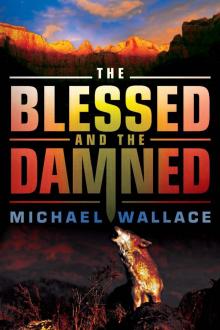 The Blessed and the Damned (Righteous Series #4)
The Blessed and the Damned (Righteous Series #4)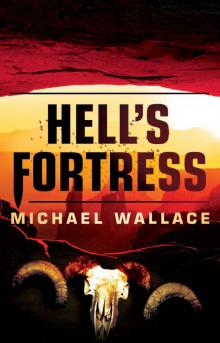 Hell's Fortress
Hell's Fortress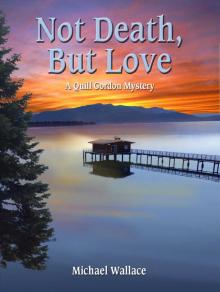 Not Death, But Love (Quill Gordon Mystery Book 3)
Not Death, But Love (Quill Gordon Mystery Book 3) Destroying Angel
Destroying Angel The Free Kingdoms (Book 2)
The Free Kingdoms (Book 2) Dragon Quadrant (The Sentinel Trilogy Book 2)
Dragon Quadrant (The Sentinel Trilogy Book 2) Shattered Sun (The Sentinel Trilogy Book 3)
Shattered Sun (The Sentinel Trilogy Book 3)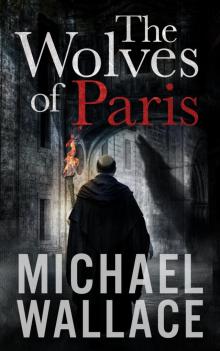 The Wolves of Paris
The Wolves of Paris Lords of Space (Starship Blackbeard Book 2)
Lords of Space (Starship Blackbeard Book 2) Dreadnought (Starship Blackbeard Book 3)
Dreadnought (Starship Blackbeard Book 3) The Village of Dead Souls: A Zombie Novel
The Village of Dead Souls: A Zombie Novel The Black Shield (The Red Sword Book 2)
The Black Shield (The Red Sword Book 2)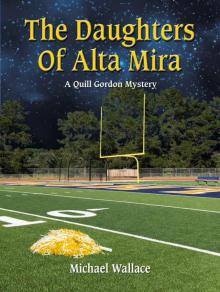 The Daughters Of Alta Mira (Quill Gordon Mystery Book 4)
The Daughters Of Alta Mira (Quill Gordon Mystery Book 4) Mighty and Strong (The Righteous)
Mighty and Strong (The Righteous)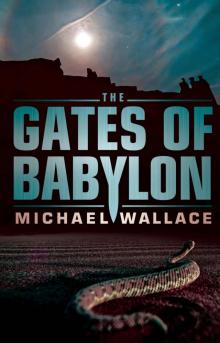 The Gates of Babylon
The Gates of Babylon